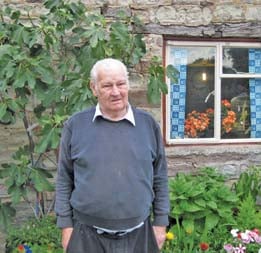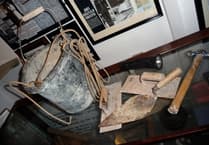FARMERS and villagers from Awre and surrounds are meeting MP Mark Harper, Environment Agency officers and county councillors in the continuing debate over plans to create 420 acres of salt marsh on what is now farmland.
The meeting on July 9 at Awre Village Hall is part of a continuing consultation process. The Environment Agency is planning to abandon a two mile strip of flood defence wall, allowing the Severn to encroach on what is now fertile arable and pastureland, creating an area of salt marsh.
Farmers and their representatives at the National Farmers Union are against the plans.
Villager Mark Awre takes up the story in his own words:
"At first glance you could be forgiven for thinking that nothing much changes in Awre. The village looks much the same as it has done for centuries, many of the houses taking their name from late 17th century owners.
It has survived plague – two burial pits are known – two World wars took their toll as evident by the names on the memorial in the centre of the village, so many for such a small community. A few years ago the farms of Awre were devastated by Foot and Mouth, nearly every cloven footed animal being slaughtered, though no evidence of the disease was found in the village. The farmers fought back from this because that is what farmers do, they look at life as a big picture, over decades not just one season at a time. Now though, Awre is in danger again, the Environment Agency having decided that about 420 acres of prime agricultural land near the River Severn should become salt marsh.
The E.A claim that after a consultation process that the banks protecting this land were no longer viable. Who they consulted is a big question, certainly not the farmers who own the land and know the riverside better than anyone. They were shocked to read a report in the Review several months ago stating that this was the case. After several meetings the E.A has apologised for the way they went about the so-called consultation, not only for Awre but also up and down the Severn on both sides. But the threat still remains.
The bank at Awre is about two miles long, the vast majority in excellent condition, there is one weak point near the bottom of Woodend Lane. We have asked repeatedly that the E.A should face up to their responsibility and do some repair work but we do not seem to be able to get a straight answer from them. Indeed in one email from them I was told that although the riverbank was their responsibility, there is not statute that says they must keep it in good repair. In one sentence, they are responsible but they are not responsible. And we thought Yes Minister was a comedy!
The E.A would like the farmers to agree to the land becoming a salt marsh. This would entail them receiving a stewardship grant for ten years, nowehere near the value of the land. The alternative being taking the chance that the bank does not collapse at the one weak point. If this happens the Severn would pour in and having no way to easily flow back it would deposit grey river mud over everything. If this happens there is no stewardship grant, absolutely nothing. The farmers want to continue to use their land as their ancestors have done for centuries. To create a salt marsh of Awre would cost millions of pounds just to remove the bank, to repair the one weak spot a pittance in comparison.
Woodend Lane runs beside the land in question and there are five residences at the river end. The low point on the road comes before you reach these homes and would be under water if the bank flooded, cutting off the people living there. This road would have to be protected if the salt marsh is created, yet more taxpayers money, surely fixing the one weak point in the bank is the more sensible answer.
Mr Chris Cadogan of Northington Farm has lived in Awre for almost 80 years. He is a farmer and fisherman, nobody knows more about the river in this area. He has seen the damage caused by very high tides which occur every few years and he knows the devastation that would occur if the bank failed, but was he consulted by the E.A? Of course not.
There are many other reasons for the E.A to abandon their plan:
1. There is a wide variety of wildlife living on this land, some rare species and some more common but all co-existing with the residents of the village. If the E.A have their way, these birds, hares, badgers, rabbits and so many others will be destroyed instantly. Drowned in the first rush of water, why would anyone even think of doing such a thing to these harmless creatures?
2. At the north end of the land in question there is a high cliff, on top of which is an electricity pylon carrying wires across the Severn. This cliff would be undercut by the flood water.
3. The Severn is over a mile wide at Awre: with all that water flowing into the fields, how long before these fields become river? Taking this long slow bend out of the river must surely endanger Bullo and St. Peters Church in Newnham.
4. River bottom land is some of the most productive in any country. Some people content that it should be allowed to revert back to it's natural state; if this was to happen we would have very little land to grow crops on in this country. The first retaining bank on the Severn at Arwe was started in 1184 and has been successfully holding the river back ever since, as can be clearly seen by the existence of medieval ridges and furrows. Until recently there was a house close to the bank lived in continuously from about 1215 until 1920. At a time of world food shortages and ever higher prices why would anyone even contemplate destroying productive farmland.
5. There is a footpath on top of the bank used by numerous people every year. Why take away the opportunity to enjoy this beautiful area?
The people of Awre do not ask for much, just the opportunity to live their lives as their ancestors have done for centuries. It is a working village, there are still animals in the fields and sometimes muck on the roads. We have a pub, a village hall and a church, if the E.A has it's way all this will change. Within a few years the farmers will have gone, you cannot farm without fields, families uprooted, traditions ended forever. Awre will become a dormitary area, people driving miles to work, houses empty except at weekends. The people of the Forest of Dean quite rightly object to the threat to sell the woodland, we ask for that same support , that same passion to save Awre."

.jpeg?width=209&height=140&crop=209:145,smart&quality=75)



Comments
This article has no comments yet. Be the first to leave a comment.